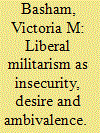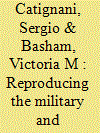|
|
|
Sort Order |
|
|
|
Items / Page
|
|
|
|
|
|
|
| Srl | Item |
| 1 |
ID:
178875


|
|
|
|
|
| Summary/Abstract |
This article explores our experiences of conducting feminist interpretive research on the British Army Reserves. The project, which examined the everyday work-Army-life balance challenges that reservists face, and the roles of their partners/spouses in enabling them to fulfil their military commitments, is an example of a potential contribution to the so-called ‘knowledge economy’, where publicly funded research has come to be seen as ‘functional’ for political, military, economic, and social advancement. As feminist interpretive researchers examining an institution that prizes masculinist and functionalist methodologies, instrumentalised knowledge production, and highly formalised ethics approval processes, we faced multiple challenges to how we were able to conduct our research, who we were able to access, and what we were able to say. We show how military assumptions about what constitutes proper ‘research’, bolstered by knowledge economy logics, reinforces gendered power relationships that keep hidden the significant roles women (in our case, the partners/spouses of reservists) play in state security. Accordingly, we argue that the functionalist and masculinist logics interpretive researchers face in the age of the knowledge economy help more in sustaining orthodox modes of knowledge production about militaries and security, and in reinforcing gendered power relations, than they do in advancing knowledge.
|
|
|
|
|
|
|
|
|
|
|
|
|
|
|
|
| 2 |
ID:
157919


|
|
|
|
|
| Summary/Abstract |
The use and maintenance of military force as a means of achieving security makes the identity and continued existence of states as legitimate protectors of populations intelligible. In liberal democracies, however, where individual freedom is the condition of existence, citizens have to be motivated to cede some of that freedom in exchange for security. Accordingly, liberal militarism becomes possible only when military action and preparedness become meaningful responses to threats posed to the social body, not just the state, meaning that it relies on co-constitutive practices of the geopolitical and the everyday. Through a feminist discursive analysis of British airstrikes in Syria and attendant debates on Syrian refugees, I examine how liberal militarism is animated through these co-constitutive sites, with differential effects. Paying particular attention to gender and race, I argue that militarism is an outcome of social practices characterized as much by everyday desires and ambivalence as by fear and bellicosity. Moreover, I aim to show how the diffuse and often uneven effects produced by liberal militarism actually make many liberal subjects less secure. I suggest therefore that despite the claims of liberal states that military power provides security, for many militarism is insecurity.
|
|
|
|
|
|
|
|
|
|
|
|
|
|
|
|
| 3 |
ID:
178134


|
|
|
|
|
| Summary/Abstract |
The necessity of making sense of our current moment, one characterized – as Andreas Bieler and Adam David Morton suggest – by the interconnected forces of global capitalism, global war and global crisis is clear. Given the continuing body counts attributable to the prioritisation of rapid economic and industrial growth over ecology, to the expansion of expeditionary and pre-emptive warfare, and to the liberalisation and deregulation of economies that has reduced social welfare safety nets around the globe to tatters, it is pertinent to ask, as Bieler and Morton do, ‘what had to have happened in the past for capitalism as a mode of production to emerge and consolidate?’.1 One of Bieler and Morton’s central aims in approaching this question is to revolt against the ‘violence of abstraction’, which drawing on Sayer’s seminal work,2 they describe as eschewing the fetishisation of concepts in favour of analysing social relations rooted in specific historical and sociological practices.3 Feminist scholars have similarly asked how patriarchy, as a set of power relations, has come about, and urged us to pay very close attention to how historical social relations in different parts of the world shape people’s presents. Just as Bieler and Morton argue that historical materialism ‘does not relegate the “economic” or the “political” to spatially separate spheres but conceives of the social constitution of the economy so that relations of production are embodied in juridical-political and ideological forms’,4 so too have feminists shown how the political, economic, juridical and ideological have worked with and through each other to substantiate patriarchal social relations that often normalise the spatial separation of social spheres. Although the book engages directly and productively with some branches of feminist thought, reflecting on points of convergence and divergence reveals some of the book’s blind spots and wider contributions. In my contribution to this forum, I consider what opportunities the book offers for rethinking feminist critique after the postmodern turn and in an age of crises, and what contemporary feminist theory in turn offers historical materialism. I ultimately aim to show how the present, and the historical and sociological forces that shape it, is necessarily both a historical materialist and feminist moment.
|
|
|
|
|
|
|
|
|
|
|
|
|
|
|
|
| 4 |
ID:
147942


|
|
|
|
|
| Summary/Abstract |
This article examines the political and social impact of elevating military values in society in a context of austerity. Centering on discussions around two British government “military ethos” initiatives, I consider the idea that military service instills desirable qualities and values in military personnel, making them well suited to educating and socializing children, to the advantage of both children and society. Arguing that these schemes primarily target boys from disadvantaged backgrounds in an effort to turn them into “productive” members of society, I suggest that military ethos initiatives contribute to not only the “raising” of working-class boys but the raising of a class-based army. Moreover, rather than focusing solely on the implications of the military ethos in the British context, I argue that its underlying assumptions about military socialization as a social good have significant geopolitical effects. Through characterizing the military as a core institution of society and its values as moral and good for children, these initiatives obscure the military’s core violent functions. Thus, by both normalizing violence and militarism in everyday life and targeting boys from disadvantaged backgrounds, “military ethos” initiatives engender the subjectivities that provide the very political, social economic, and indeed practical resources that make war possible.
|
|
|
|
|
|
|
|
|
|
|
|
|
|
|
|
| 5 |
ID:
178186


|
|
|
|
|
| Summary/Abstract |
The notions that military violence engenders security and that military service is a selfless and necessary act are orthodoxies in political, military and scholarly debate. The UK Army Reserve’s recent expansion prompts reconsideration of this orthodoxy, particularly in relation to the suggestion that reservists serve selflessly. Drawing on fieldwork with British Army reservists and their spouses/partners, we examine how this orthodoxy allows reservists to engage in everyday embodied performances, and occasionally articulations, of the need to serve, in order to free themselves up from household responsibilities. This supposed necessity of military service necessitates heteropatriarchal divisions of labour, which facilitate participation in military service and the state’s ability to conduct war/war preparations. However, while reserve service is represented as sacrificial and necessary, it is far more self-serving and is better understood as ‘serious leisure’, an activity whose perceived importance engenders deep self-fulfilment. By showing that the performances of sacrifice and necessity reservists rely on are selfish, not selfless, we show how militarism is facilitated by such everyday desires. We conclude by reflecting on how exposing reserve service as serious leisure could contribute to problematizing the state’s ability to rely on everyday performances and articulations of militarism and heteropatriarchy to prepare for and wage war.
|
|
|
|
|
|
|
|
|
|
|
|
|
|
|
|
|
|
|
|
|